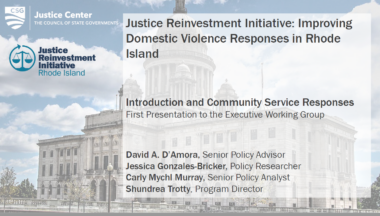
Rhode Island Domestic Violence Executive Working Group Meets to Discuss Analysis of Community Service Responses
After launching a bipartisan, interbranch effort to improve domestic violence responses earlier this year, Rhode Island’s first meeting of the Governor’s Domestic Violence Executive Working Group occurred on October 24, 2022. CSG Justice Center staff presented findings from an analysis of community service responses to domestic violence.
The analysis, informed by interviews, surveys, focus groups, and quantitative analysis of more than 45,000 files from the Rhode Island Coalition Against Domestic Violence, highlighted several key findings:
- The standardization and applicability of domestic violence training and education for community service staff can be improved.
- Data collection and reporting practices vary across agencies, and partnerships are not clearly defined. As such, there are not mechanisms among agencies for sharing information about victims or survivors or coordinating service provision.
- Funding and resources to meet the spectrum of victim and survivor needs are constrained, impacting service delivery and relationships among community service agencies.
- Community service organizations are working with victims and survivors by providing advocacy to address complex needs related to domestic violence, though gaps exist. Current responses do not consistently and holistically meet the needs of victims and survivors, particularly those who do not speak English; are Deaf, DeafBlind, or Hard of Hearing; are not White; are LGBTQ+; or who identify as having a disability.
Like most states, Rhode Island is impacted by the health and public safety risks of domestic violence. More than 32 percent of women and 25 percent of Rhode Island men have experienced domestic violence, and data are unavailable for transgender or gender nonconforming individuals.
Programmatic challenges, such as unstable funding and resources and gaps in services for victims and survivors, continue to challenge domestic violence responses statewide. The working group aims to target these challenges through the innovative use of the Justice Reinvestment approach, involving analyses of state data and interviews with key stakeholders led by the CSG Justice Center.
The next presentation will be held on December 5 and will focus on law enforcement, child welfare, and court responses to domestic violence. Policy and practice recommendations will be available in the spring of 2023.
This project was supported by Grant No. 2020-ZB-BX-0022 awarded by the Bureau of Justice Assistance. The Bureau of Justice Assistance is a component of the Department of Justice’s Office of Justice Programs, which also includes the Bureau of Justice Statistics, the National Institute of Justice, the Office of Juvenile Justice and Delinquency Prevention, the Office for Victims of Crime, and the SMART Office. Points of view or opinions in this document are those of the author and do not necessarily represent the official position or policies of the U.S. Department of Justice.
About the author

Arkansas policymakers have long expressed concerns about the state’s high recidivism rate. Over the past 10 years, an…
Read MoreIn April 2025, Arkansas Governor Sarah Huckabee Sanders signed a package of bipartisan criminal justice legislation into law,…
Read More Explainer: Key Findings and Options from Arkansas’s Justice Reinvestment Initiative
Explainer: Key Findings and Options from Arkansas’s Justice Reinvestment Initiative
Arkansas policymakers have long expressed concerns about the state’s high recidivism rate.…
Read More Explainer: How a New Law in Arkansas Tackles Crime, Recidivism, and Community Supervision Challenges
Explainer: How a New Law in Arkansas Tackles Crime, Recidivism, and Community Supervision Challenges
In April 2025, Arkansas Governor Sarah Huckabee Sanders signed a package of…
Read More










